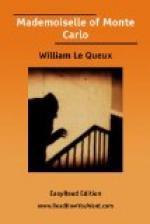“You are not speaking the truth.”
“Why should I tell it to you? I do not know you!” was the quick retort.
“But you are harbouring me.”
“At the orders of Il Passero.”
“You surely can tell me what you know of Mademoiselle,” Hugh persisted after a brief pause. “We are mutually her friends. The attempt to kill her is outrageous, and I, for one, intend to do all I can to trace and punish the culprit.”
“They say that you shot her.”
“Well—you know that I did not,” Henfrey said. “Have you yourself ever met Mademoiselle?”
“I have seen her. She was living for a time at Santa Margherita last year. I had a friend of hers living here with me and I went to her with a message. She is a very charming lady.”
“And a friend of Il Passero?”
The Italian shrugged his shoulders with a gesture of ignorance.
Hugh Henfrey had certainly learned much that was curious. He had never before heard of the interesting cosmopolitan thief known as The Sparrow, but it seemed evident that the person in question had suddenly become interested in him for some obscure and quite unaccountable reason.
As day followed day in that humble place of concealment, Beppo told him many things concerning the famous criminal Il Passero, describing his exploits in terms of admiration. Hugh learnt that it was The Sparrow who had planned the great jewel robbery at Binet’s, in the Rue de la Paix, when some famous diamonds belonging to the Shah of Persia, which had been sent to Paris to be reset, were stolen. It was The Sparrow, too, who had planned the burglary at the art gallery of Evans and Davies in Bond Street and stolen Raphael’s famous Madonna.
During the daytime Hugh, anxious to get away to Brussels, but compelled to obey the order of the mysterious Passero, spent the time in smoking and reading books and newspapers with which Beppo’s wife provided him, while at night he would take long walks through the silent city, with its gloomy old palaces, the courtyards of which echoed to his footsteps. At such times he was alone with his thoughts and would walk around the port and out upon the hills which surrounded the bay, and then sit down and gaze out to the twinkling lights across the sea and watch the long beams of the great lighthouse searching in the darkness.
His host and hostess were undoubtedly criminals. Indeed, they did not hide the fact. Both were paid by The Sparrow to conceal and provide for anyone whom he sent there.
He had been there four weary, anxious days when one evening a pretty, well-dressed young French girl called, and after a short chat with Beppo’s wife became installed there as his fellow-guest. He did not know her name and she did not tell him.
She was known to them as Lisette, and Hugh found her a most vivacious and interesting companion. Truly, he had been thrown into very queer company, and he often wondered what his friends would say if they knew that he was guest in a hiding-place of thieves.




